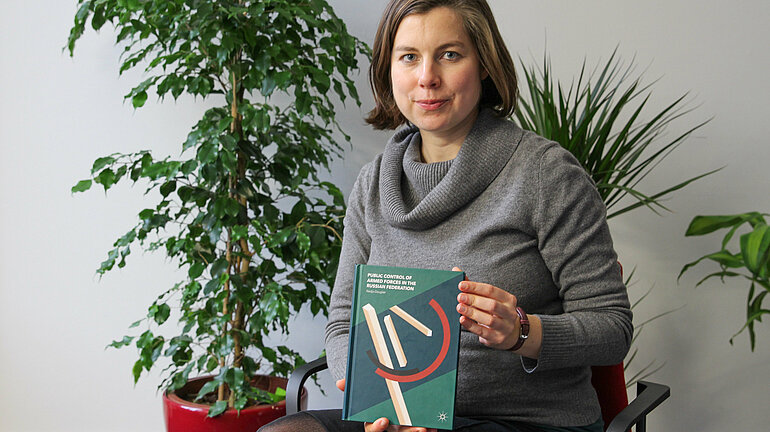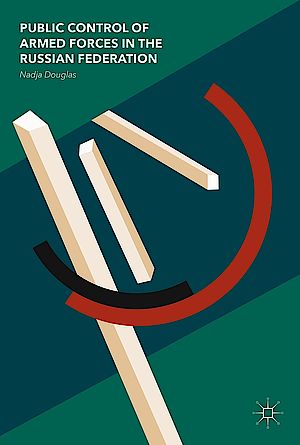“Putin recognises the military’s potential to foster patriotism”
In her book Public Control of Armed Forces in the Russian Federation (2017), Nadja Douglas turns the spotlight on civil-military relations in Russia. She spoke to numerous civil society activists who keep a watchful eye on Russia’s resurgent military apparatus and attempt to exert a measure of control at various levels.

Nadja, to what extent is it appropriate to talk about the remilitarisation of Russian politics?
Russia currently ranks fourth in the Global Militarization Index (GMI) – published regularly by the Bonn International Center for Conversion (BICC) – and that is very telling. Of course, the military has always played a prominent role in Russia, but militarisation is certainly the appropriate word at present. In the 1990s, after the demise of the USSR, the military was relatively weak. It was also corrupt and underfunded and consequently had a very poor public image. However, this all changed during Vladimir Putin’s second term in office. The Russian President is investing heavily in the armed forces and materiel. He recognises the military’s potential to foster patriotism, which is why he was so keen to restore the armed forces’ lost status. The belief in the strength of the Russian military and the willingness to defend the motherland helped to close the post-Soviet vacuum and reaffirm national identity. In a sense, it gave people a frame of reference. In order to underline the message, Putin holds annual military parades, which are becoming increasingly bombastic. Relics of the Soviet era are being revitalised at the same time, such as paramilitary organisations whose aim is to strengthen defence readiness, and military-patriotic education in schools. This is a backward-looking, insular policy. It’s worrying as it reinforces Russia’s isolation.
Which aspects of this process are viewed particularly critically by the civil society activists who feature in your book?
Again, we need to go back to the 1990s. During the war in Chechnya, human rights were abused on a massive scale because conscripts were sent to a war zone with no experience at all. The first wave of resistance against this abuse came from the Committees of Soldiers' Mothers. Later, other civil society organisations were set up with the aim of uncovering poor governance and drawing the government’s attention to abuse in the military. Besides human rights violations, this abuse included hazing of younger recruits by more senior officers; there is also the problem of suicides, which are still on the increase. However, various strands can be discerned within civil society. Some civil society organisations are fairly traditionalist and feel duty bound to support the military by improving conscripts’ health and welfare, for example. Others view the developments within politics and society as problematical – not only the improved status of the military but also the inflated defence budget, which is disproportionate compared with social, health and education spending. This is bound to cause conflicts in the long term.
Which opportunities does civil society have to exert some measure of control?
At the lowest level, there is monitoring and perhaps intervention in individual cases if a recruit needs help. Other measures generally focus on publicity, which means working with the media. Here, the main priority is to exert pressure and thus create an opportunity to influence policy. And then there is more systematic control, with some organisations working with the authorities at the local level. I should add, however, that Russia is a vast country and the authorities’ stance varies from region to region. Some are very willing to cooperate as they are keen to be informed about abuses and have an interest in investigating them. But in Russia, we have a system which is centred entirely around the President, which means that local administrations have very limited scope to initiate genuine reforms. And of course there are regions where problems are hushed up and are a taboo subject because they are not permitted to exist – at least, not officially. In those situations, civil society is marginalised to an extreme degree.

How does the public at large view this civil society engagement? Is it viewed positively, or is it seen an affront to the military’s reputation?
I would say that in recent years, no one has been interested in hearing about abuses. Military patriotism has taken hold to such an extent that nowadays, people are only willing to see the positives. After the trauma of the disintegration of the Soviet Union, there is a sense that: “Our President has made Russia a world player again and made our military a force to be reckoned with, so let’s ignore the problems for the time being.”
How do you see remilitarisation, on the one hand, and civil society control, on the other, evolving over the next few years?
First, I think that the reinforcement of the military will continue until at least 2020, but it won’t go on indefinitely. After all, it is common knowledge that Russia’s economy is in a bad shape, partly due to the collapse of oil prices but also (although no one admits this) as a result of the sanctions imposed by the West and the counter-sanctions introduced by Russia. So the government does not have endless resources to invest in the armed forces and materiel. And it may well be the case that at some point, the Russian people object to the imbalance and the cuts in spending on education, health and pensions. My second point relates to civil society. Despite extremely challenging conditions and outright repression, civil society has proved to be extremely resilient. So I believe that civil society will continue its work – because the problem won’t go away.
The interview was conducted by Yvonne Troll, communications coordinator at ZOiS.
Nadja Douglas is a political scientist and researcher at ZOiS. Her current project focuses on the relationship between public initiatives and state power structures in the post-Soviet region.
Douglas, Nadja. Public Control of Armed Forces in the Russian Federation. New York: Palgrave Macmillan, 2017.